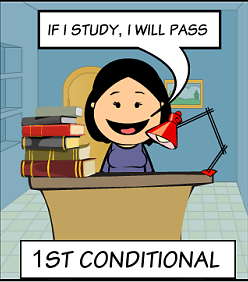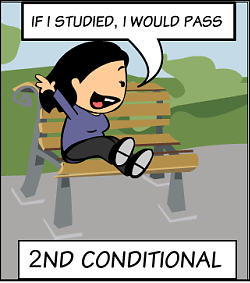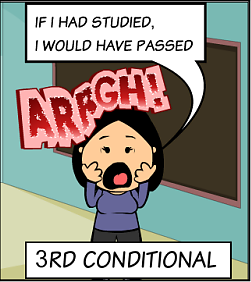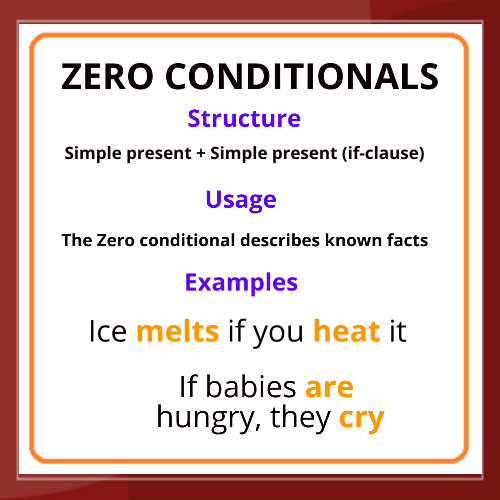CONDITIONAL SENTENCES for Class 11 ENGLISH
WHAT IS CONDITIONAL SENTENCES?
A Conditional Sentence talks about real or unreal situations/desire/condition in past, present and future. In Conditional Sentences, the existence of one function depends on the other.
Conditional Sentence has two clauses-
Note:- Two modal verb is never used in a sentence. Also, modals verb is not used with 'If Clause'.
EXPLANATION
वो वाक्य जो भूत, वर्तमान, और भविष्य की real और Unreal situations/desire/condition की बात करे, Conditional Sentence कहलाता है। Conditional Sentences में एक कार्य का होना दूसरे कार्य पर निर्भर करता है।
Conditional Sentence में दो clause होते हैं-
Note:– एक Sentence में कभी भी दो Modals Verb का प्रयोग नहीं किया जाता है। साथ ही 'If Clause' के साथ Modals Verb का प्रयोग नहीं किया जाता है।
CONDITIONAL SENTENCES TYPE 1

Conditional Sentences Type 1
It is a possible condition, it is likely to happen in the future.
यह एक Possible condition है इसके भविष्य में होने की संभावना होती है।
In Hindi two sentences can be of future tense but in English two sentences are not of future tense. In Conditional Sentences Type 1, both the sentences in Hindi are in Future, but while making English with which so/if is attached, ‘If’ is used in it and is made in Simple Present Tense, whereas with which ‘so’ is written, it is made with the help of Simple Future Tense.
हिंदी में दो Sentence Future Tense के हो सकते हैं, परंतु अंग्रेजी में दो sentences future tense के नहीं हो सकते हैं। Conditional Sentences Type 1 में हिंदी में दोनों वाक्य Future में होते है, परंतु अंग्रेजी बनाते वक्त जिसके साथ यदि/अगर लगा होता है उसमे ‘If’ का प्रयोग किया जाता है, और Simple Present Tense में बनाया जाता है, जबकि जिसके साथ ‘so’ लिखा होता है उसे Simple Future Tense की सहायता से बनाया जाता है।
Conditional Sentences Structure
If + subject + V1/V5 + other words, subject + shall/will + V1 + other words.
या,
subject + shall/will + V1 + other words, If + subject + V1/V5 + other words.
Conditional Sentences Type 1 Examples-
CONDITIONAL SENTENCES TYPE 2

Conditional Sentences Type 2
It is a hypothetical condition that is likely to be fulfilled in the future.
यह एक काल्पनिक शर्त (hypothetical condition) है जिसका भविष्य में पुरा होने की संभावना हैं।
In conditional sentence type 2, with which if/so is used, then ‘if’ is used in it and that sentence is made with the help of simple past tense as well as in which 'then' is attached i.e. in the second clause after the subject would + Verb (first form) is used.
Conditional Sentence type 2 में जिसके साथ यदि/अगर लगा होता है उसमे ‘If’ का प्रयोग किया जाता है और उस सेंटेंस को simple past tense की सहायता से बनाया जाता है साथ ही जिसमें 'तो' लगा होता है यानि दूसरी clause में सब्जेक्ट के बाद would + Verb (first form) का प्रयोग किया जाता है।
Conditional sentences Structure
If + subject + verb (second form) + other words, subject + would + verb (first form) + other words.
या,
subject + would + verb (first form) + other words, If + subject + verb (second form) + other words.
Conditional sentences Type 2 Examples
CONDITIONAL SENTENCES TYPE 3

Conditional Sentences Type 3
This is also a hypothetical condition but it has no possibility of being fulfilled in the future.
यह भी एक काल्पनिक शर्त है परंतु इसका भविष्य में पुरा होने की कोई संभावना नहीं होता है।
In Conditional Sentence Type 3 with which if/so is followed by If and that sentence is formed by Past Perfect Tense and second Clause with which 'then' is used is followed by the subject in that clause. Would have + Verb (third form) is used.
Conditional Sentence Type 3 में जिसके साथ यदि/अगर लगा होता है उसमे ‘If’ का प्रयोग किया जाता है और उस सेंटेंस को Past Perfect Tense के द्वारा बनाया जाता है और दूसरी Clause जिसके साथ 'तो' लगा होता है उस clause में सब्जेक्ट के बाद would have + Verb (third form) का प्रयोग किया जाता है।
Conditional Sentences Structure
If + subject + had + verb (third form)+ other words, subject + would + have + verb (third form) + Other words.
या,
subject + would + have + verb (third form) + other words, If + subject + had + verb (third form) + other words.
Conditional Sentences Type 3 Examples
CONDITIONAL SENTENCES TYPE 0

Conditional Sentences Type 0
In this, there is every possibility of getting the result as per the condition. While translating such sentences into English, both the sentences are made with the help of Present Indefinite Tense.
इसमें शर्तनुसार परिणाम के होने की पूरी संभावना होती है। इस तरह के वाक्यों को अंग्रेजी अनुवाद करते वक्त दोनो वाक्यों को Present Indefinite Tense की सहायता से बनाया जाता है।
Conditional Sentences Structure
If + subject + V1/V5 + other words, subject + V1/V5 + other words.
Conditional Sentences Type 0 Examples
CONDITIONAL SENTENCES EXAMPLES
Exercise-
1. If we meet at 9:30, we ___ ___ plenty of time.
2. Lisa would find the milk if she ______in the fridge.
3. The zookeeper would have punished her with a fine if she___ ___ the animals.
4. If you spoke louder, your classmates ______ you.
5. Dan______ safe if he drove slowly.
6. You ______no trouble at school if you had done your homework.
7. If you ______in this lake, you'll shiver from cold.
8. The door will unlock if you ______the green button.
9. If Mel ______ her teacher, he'd have answered her questions.
10. I ______the office if I was/were you.
Answers-
1. If we meet at 9:30, we will have plenty of time.
2. Lisa would find the milk if she looked in the fridge.
3. The zookeeper would have punished her with a fine if she had fed the animals.
4. If you spoke louder, your classmates would understand you.
5. Dan would arrive safe if he drove slowly.
6. You would have had no trouble at school if you had done your homework.
7. If you swim in this lake, you'll shiver from cold.
8. The door will unlock if you press the green button.
9. If Mel had asked her teacher, he'd have answered her questions.
10. I would call the office if I was/were you.
PRACTICE QUESTIONS
Conditional exercise (first/second/third conditionals)
1. (First conditional) If we __________________ (not/work) harder, we __________________ (not pass) the exam.
2. (Third conditional) If the students __________________ (not be) late for the exam, they __________________ (pass).
3. (Third conditional) If the weather __________________ (not be) so cold, we __________________ (go) to the beach.
4. (Second conditional) If she __________________ (have) her laptop with her, she __________________ (email) me.
5. (First conditional) If she __________________ (not go) to the meeting, I __________________ (not go) either.
6. (Third conditional) If the baby __________________ (sleep) better last night, I __________________ (not be) so tired.
7. (First conditional) If the teacher __________________ (give) us lots of homework this weekend, I __________________ (not be) happy.
8. (Second conditional) If Lucy __________________ (have) enough time, she __________________ (travel) more.
9. (First conditional) If the children __________________ (not eat) soon, they __________________ (be) grumpy.
10. (First conditional) If I __________________ (not go) to bed soon, I __________________ (be) tired in the morning.
11. (Second conditional) If I __________________ (want) a new car, I __________________ (buy) one.
12. (Second conditional) If José __________________ (not speak) good French, he __________________ (not move) to Paris.
13. (First conditional) If John __________________ (drink) too much coffee, he __________________ (get) ill.
14. (Third conditional) If we __________________ (tidy) our flat, we __________________ (not lose) our keys.
15. (Third conditional) If Luke __________________ (not send) flowers to his mother, she __________________ (not be) happy.
16. (Second conditional) If the children __________________ (be) in bed, I __________________ (be able to) have a bath.
17. (Second conditional) If you __________________ (not be) so stubborn, we __________________ (not have) so many arguments!
18. (Third conditional) If Julie __________________ (not go) to Sweden, she __________________ (go) to Germany.
19. (First conditional) If she __________________ (go) to the library, she __________________ (study) more.
20. (Third conditional) If we __________________ (not have) an argument, we __________________ (not be) late.
21. (Second conditional) If you __________________ (arrive) early, it __________________ (be) less stressful.
22. (Third conditional) If I __________________ (not go) to the party, I __________________ (not meet) Amanda.
23. (Second conditional) If Julie __________________ (like) chocolate, I __________________ (give) her some.
24. (Second conditional) If Luke __________________ (live) in the UK, I __________________ (see) him more often.
25. (Third conditional) If the children __________________ (not eat) all that chocolate, they __________________ (feel) sick.
26. (First conditional) If they __________________ (not/arrive) soon, we __________________ (be) late.
27. (Third conditional) If she __________________ (study) Mandarin, she __________________ (go) to Beijing.
28. (Second conditional) If we __________________ (not be) so tired, we __________________ (go) out.
29. (First conditional) If you __________________ (buy) the present, I __________________ (wrap) it up.
30. (First conditional) If Lucy __________________ (not quit) her job soon, she __________________ (go) crazy.
Answers
1. (First conditional) If we don’t work harder, we won’t pass the exam.
2. (Third conditional) If the students hadn’t been late for the exam, they would have passed.
3. (Third conditional) If the weather hadn’t been so cold, we would have gone to the beach.
4. (Second conditional) If she had her laptop with her, she would email me.
5. (First conditional) If she doesn’t go to the meeting, I won’t go either.
6. (Third conditional) If the baby had slept better last night, I wouldn’t have been so tired.
7. (First conditional) If the teacher gives us lots of homework this weekend, I won’t be happy.
8. (Second conditional) If Lucy had enough time, she would travel more.
9. (First conditional) If the children don’t eat soon, they’ll be grumpy.
10. (First conditional) If I don’t go to bed soon, I’ll be tired in the morning.
11. (Second conditional) If I wanted a new car, I would buy one.
12. (Second conditional) If José didn’t speak good French, he wouldn’t move to Paris.
13. (First conditional) If John drinks too much coffee, he’ll get ill.
14. (Third conditional) If we had tidied our flat, we wouldn’t have lost our keys.
15. (Third conditional) If Luke hadn’t sent flowers to his mother, she wouldn’t have been happy.
16. (Second conditional) If the children were in bed, I would be able to have a bath.
17. (Second conditional) If you weren’t so stubborn, we wouldn’t have so many arguments!
18. (Third conditional) If Julie hadn’t gone to Sweden, she would have gone to Germany.
19. (First conditional) If she goes to the library, she’ll study more.
20. (Third conditional) If we hadn’t had an argument, we wouldn’t have been late.
21. (Second conditional) If you arrived early, it would be less stressful.
22. (Third conditional) If I hadn’t gone to the party, I wouldn’t have met Amanda.
23. (Second conditional) If Julie liked chocolate, I would give her some.
24. (Second conditional) If Luke lived in the UK, I would see him more often.
25. (Third conditional) If the children hadn’t eaten all that chocolate, they wouldn’t have felt sick.
26. (First conditional) If they don’t arrive soon, we’ll be late.
27. (Third conditional) If she had studied Mandarin, she would have gone to Beijing.
28. (Second conditional) If we weren’t so tired, we would go out.
29. (First conditional) If you buy the present, I’ll wrap it up.
30. (First conditional) If Lucy doesn’t quit her job soon, she’ll go crazy.